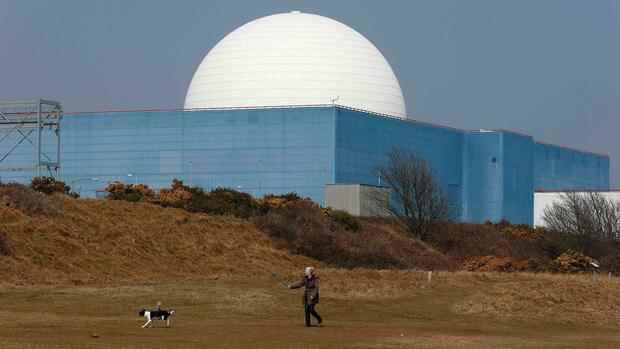A woman walks along the Sizewell B nuclear reactor in Suffolk. In addition, a new power plant Sizewell C is to be built.
(Photo: Reuters)
Berlin Boris Johnson’s “Easter package” bears some similarities to Robert Habeck’s. Both the British Prime Minister and the German Economics and Climate Minister want to massively expand renewable energies in order to achieve their climate goals.
However, there is one serious difference: while Johnson is also planning up to eight new nuclear power plants by 2050 according to his energy strategy presented today, Habeck is sticking to it: “Nuclear power? No thank you.”
With his ambitious expansion of nuclear energy, Johnson prevailed against his Chancellor of the Exchequer, Rishi Sunak, who sees this as a significant cost to the British budget. Especially since the state is said to be on the verge of taking a 20 percent stake in the planned Sizewell C nuclear reactor in Suffolk.
>> Also read here: The original Easter package: This is how the coalition wants to expand renewable energies
Top jobs of the day
Find the best jobs now and
be notified by email.
According to Johnson, nuclear power should contribute about a quarter of electricity generation by 2030. Today the proportion is around 16 percent. Technologically, the British are also relying on smaller reactors, which are being developed by the turbine manufacturer Rolls-Royce.
In addition, the British Prime Minister also wants to make much greater use of wind power off the coast of Great Britain. The capacity of the wind turbines is to be increased fivefold from the current ten gigawatts to 50 gigawatts by 2030. The government in London would like to achieve a similar boost in solar energy, which has so far generated 14 gigawatts of electricity. All together, the aim is to make the UK emissions-free by 2050.
Fracking is still on hold
Johnson, on the other hand, is still reluctant to expand fracking further, although many party members support the controversial oil and gas extraction technology. Experts should first investigate the associated risks of earthquakes. There should also not be a rapid expansion of wind power in the English countryside for the time being. Johnson shuns the lengthy approval process and opposition from the conservative rural population. And then the money was apparently no longer enough for investments in better energy efficiency.
British Prime Minister Boris Johnson in the control center of the Hinkley nuclear power plant.
(Photo: Reuters)
According to the prime minister, the energy strategy should not only “reduce the country’s dependence on electricity sources that are exposed to fluctuating international prices that we cannot control”. Unlike Germany, Great Britain is hardly dependent on energy supplies from Russia. Imports of Russian coal and oil are scheduled to be phased out by the end of the year. Shortly thereafter, no more gas should be imported from Putin’s empire. In any case, the British only obtain around three percent of their gas supplies from Russia. Johnson promised that “greater self-sufficiency” would also push down the explosive rise in energy costs.
The government has just had to adjust the price cap for 22 million British households to the sharp rise in market prices, which is pushing up bills by more than 50 percent. The next price increase is already looming in October. However, according to Economics Minister Kwasi Kwarteng, the British cannot expect a quick relief from the energy strategy.
Ed Miliband, the energy policy spokesman for the opposition Labor Party, has criticized Johnson’s strategy as “hopeless” because it does nothing to combat the rising cost of living. The government’s strategy does nothing to help people with their energy bills or give them more energy security.
More: The Russian crisis saved Boris Johnson politically – for the time being
